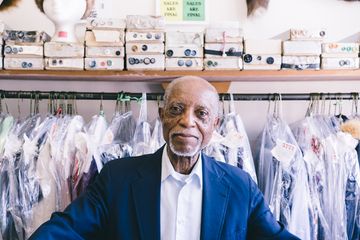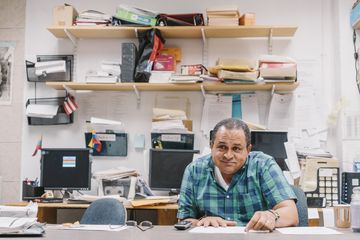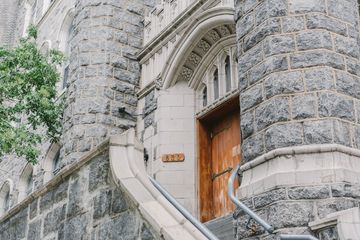From the outside, there might not seem to be anything particularly remarkable about Joe Eady’s Fashion City. However, when the Manhattan Sideways team ventured inside during the summer of 2017, we met the person who makes the store special: Joe, a warm, wonderful man who told us that he has been on 145th Street for over fifty years. A born and bred Harlemite, Joe was exposed to tailoring at a young age by his mother. Despite not being a seamstress, she was thrifty and knew her way around a sewing machine, and she enlisted Joe as an assistant in operating the foot pedal. After this early introduction to the field, Joe went on to attend Central-Needle Trades High School, where he graduated at the top of his class in men’s tailoring in 1953. His achievement is made even more impressive by the fact that he was the first high school graduate in his family. “College was never an option in my family, ” he went on to say, which is why he sought a job right out of school. Laughing, he told us that he wound up in the Garment District “doing anything but men’s tailoring, ” which prompted him to try for higher education. Joe enrolled in the Hampton Institute in Virginia, where he completed his teacher training in 1958. But before he could make use of his degree, Joe was drafted into the army and did two years of service. When he eventually returned to New York in December of 1960, he said teaching jobs were scarce and he had to pick up odd jobs. “The landlord doesn’t ask you where you got the money from; you have to do whatever it takes to pay the rent, ” he remarked. It was not until 1964 that Joe was able to open a tailoring shop on 145th street. We were fascinated to learn that when he started out, many of his clients were local hustlers who needed custom suits. Custom tailoring, and trousers in particular, was his main enterprise. As a result, the rise in popularity of blue jeans in the ‘70s put a substantial dent in his business. Joe was undeterred, however. “I’ve been thinking outside the box all my life, ” he declared - a mindset that spurred him to add leather and fur to his offered services. Fur refurbishing and restyling was especially in demand at the time, since it was impractical for the average consumer to purchase new or real fur frequently. Joe added, “People are fine with wearing old fashions as long as I can bring them back to life. ” Nowadays, the popularity of fur is dying down due to the efforts of organizations like PETA, but Joe is confident in his ability to keep evolving, simply saying, “I’m an optimistic person. You have to be optimistic in business. ” This philosophy has obviously paid off, as he continues to thrive so many decades later. He has served three generations of customers and has weathered the many historical events that have struck Harlem, including the riots and a slew of break-ins that took place following the assassination of Martin Luther King. Joe insisted that the only secret to his longevity is his devotion to customer service. “This is my neighborhood; you have to have a good reputation. ”As for his plans for the future, he revealed that he eventually hopes to combine his knowledge of teaching and tailoring by opening a training school to instruct others in the basics of his craft. “I’ve got all kinds of crazy plans, ” he finished, cheerfully.



